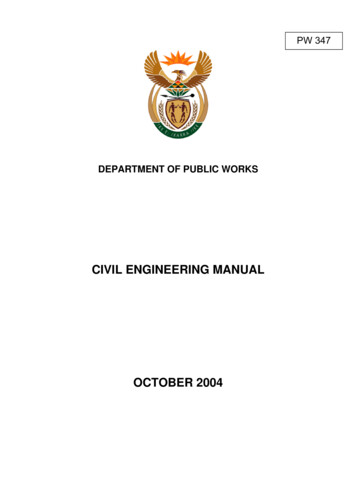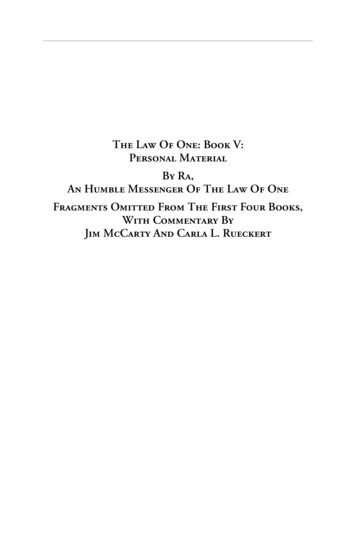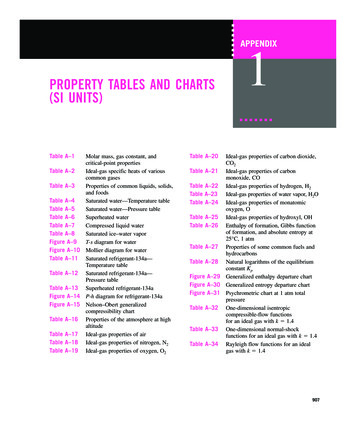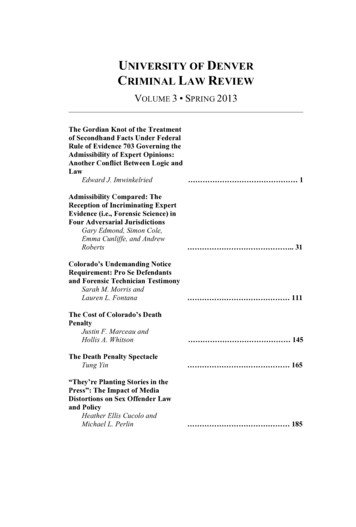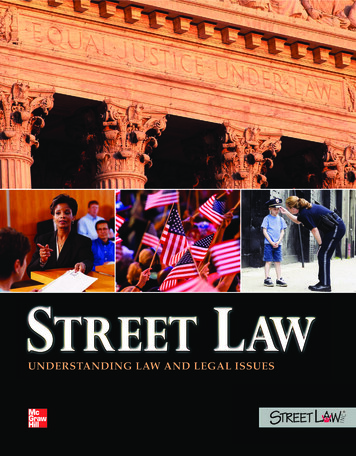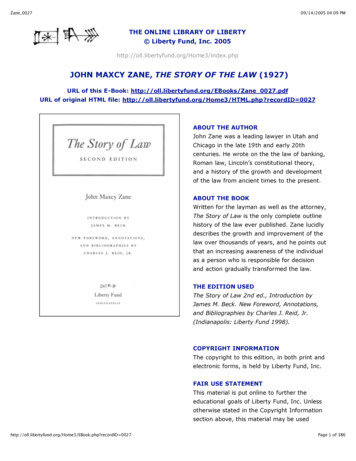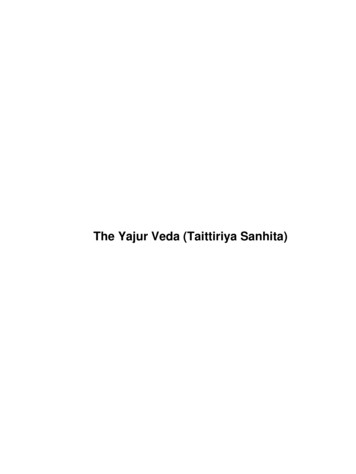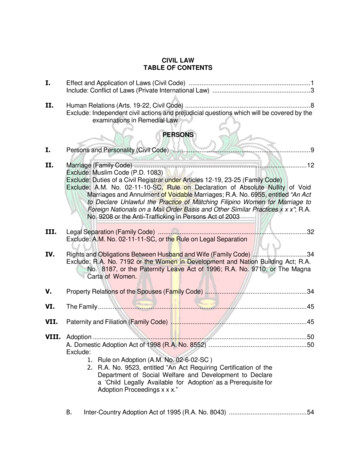
Transcription
CIVIL LAWTABLE OF CONTENTSI.Effect and Application of Laws (Civil Code) . 1Include: Conflict of Laws (Private International Law) . 3II.Human Relations (Arts. 19-22, Civil Code) . 8Exclude: Independent civil actions and prejudicial questions which will be covered by theexaminations in Remedial LawPERSONSI.Persons and Personality (Civil Code) . 9II.Marriage (Family Code) . 12Exclude: Muslim Code (P.D. 1083)Exclude: Duties of a Civil Registrar under Articles 12-19, 23-25 (Family Code)Exclude: A.M. No. 02-11-10-SC, Rule on Declaration of Absolute Nullity of VoidMarriages and Annulment of Voidable Marriages; R.A. No. 6955, entitled “An Actto Declare Unlawful the Practice of Matching Filipino Women for Marriage toForeign Nationals on a Mail Order Basis and Other Similar Practices x x x”; R.A.No. 9208 or the Anti-Trafficking in Persons Act of 2003III.Legal Separation (Family Code) . 32Exclude: A.M. No. 02-11-11-SC, or the Rule on Legal SeparationIV.Rights and Obligations Between Husband and Wife (Family Code) . 34Exclude: R.A. No. 7192 or the Women in Development and Nation Building Act; R.A.No. 8187, or the Paternity Leave Act of 1996; R.A. No. 9710, or The MagnaCarta of Women.V.Property Relations of the Spouses (Family Code) . 34VI.The Family . 45VII.Paternity and Filiation (Family Code) . 45VIII. Adoption . 50A. Domestic Adoption Act of 1998 (R.A. No. 8552) . 50Exclude:1. Rule on Adoption (A.M. No. 02-6-02-SC )2. R.A. No. 9523, entitled “An Act Requiring Certification of theDepartment of Social Welfare and Development to Declarea ‘Child Legally Available for Adoption’ as a Prerequisite forAdoption Proceedings x x x.”B.Inter-Country Adoption Act of 1995 (R.A. No. 8043) . 54
Exclude: Articles 183-188, 191-193 (Family Code)IX.Support (Family Code) . 54X.Parental Authority (Family Code) . 57Exclude:1. Rule on Guardianship of Minors (A.M. No. 03-02-05-SC)2. Rules on Custody of Minors and Writ of Habeas Corpus in Relationto Custody of Minors (A.M. No. 03-04-04-SC)3. Solo Parents' Welfare Act of 2000 (R.A. No. 8972)4. The Early Childhood Care and Development Act (R.A. No. 8980)Exclude: R.A. No. 9231, entitled “An Act Providing for the Elimination of the WorstForms of Child Labor and Affording Stronger Protection for the Working Child xx x,” which will be covered under Labor LawInclude: Child Abuse Law (R.A. No. 7610) . 60XI.Emancipation (Arts. 234 and 236, Family Code, as amended by R.A. No. 6809 whichlowered the age of majority)XII.Summary Judicial Proceedings in Family Law CasesXIII. Retroactivity of the Family Code (Art. 256)Exclude: Arts. 254-255, 257 (Family Code)XIV.Funerals (Arts. 305-310, Civil Code)Exclude: Care and Education of Children (Arts. 356-363, Civil Code)XV.Use of Surnames. 60Arts. 364-369, 369-380, Civil Code (other articles repealed by Family Code)XVI.Absence (Art. 43, Civil Code; Art. 41, Family Code)XVII. Civil Registrar . 61Exclude: Act No. 375 and the Implementing Rules and Regulations of R.A. No. 9048PROPERTYI.II.III.IV.V.Characteristics . 61Classification . 63Ownership. 65Accession . 67Quieting of Title to or Interest in and Removal or Prevention of Cloud over Title to orInterest in Real Property . 73VI.Co-ownership . 73VII. Possession . 75VIII. Usufruct . 77IX.Easements . 78X.Nuisance . 81XI.Modes of Acquiring Ownership . 81
PRESCRIPTIONI.II.III.DefinitionNo prescription applicablePrescription or limitation of actions . onElements of an Obligation . 87Different Kinds of PrestationsClassification of Obligations . 87Sources of Obligations . 88Nature and Effect of Obligations . 88Kinds of Civil Obligations . 91Joint and Solidary Obligation . 91Extinguishment of Obligations. 94CONTRACTSI.II.III.IV.V.Essential Requisites . 100Kinds of Contracts . 100Formality . 104Defective Contracts . 106Effect of Contracts . .XIV.XV.XVI.Definition and Essential Requisites of a Contract of Sale . 109Parties to a Contract of Sale . 114Subject Matter . 116Obligations of the Seller to Transfer Ownership . 116Price . 117Formation of Contract of Sale . 119Transfer of Ownership . 123Risk of Loss . 123Documents of Title . 123Remedies of an Unpaid Seller . 123Performance of Contract . 124Warranties . 125Breach of Contract . 125Extinguishment of the Sale . 125The Subdivision and Condominium Buyers' Protective Decree (P.D. 957) . 126The Condominium Act (R.A. No. 4726) . 126Exclude: Electronic Commerce Act of 2000 (R.A. No. 8792); Public Land Law,Retail Trade and Liberalization Act, Bulk Sales Law (Act No. 3952)
SUCCESSIONI.II.III.IV.General Provisions . 126Testamentary Succession . 126Legal or Intestate Succession. 136Provisions Common to Testate and Intestate Succession . 145Exclude: Executors and administrators (Arts. 1058-1060, Civil Code), which willbe covered under Remedial LawPARTNERSHIPI.II.III.IV.V.VI.Contract of Partnership . 147Rights and Obligations of Partnership . 151Rights and Obligations of Partners Among Themselves . 151Obligations of Partnership/Partners to Third Persons . 151Dissolution . 152Limited Partnership. ion of Agency. 153Powers. 153Express vs. Implied AgencyAgency by EstoppelGeneral vs. Special AgencyAgency Couched in General Terms . 153Agency Requiring Special Power of Attorney . 153Agency by Operation of LawRights and Obligations of Principal . 155Irrevocable Agency . 155Modes of Extinguishment . 156COMPROMISEI.II.III.DefinitionVoid Compromise . 156EffectCREDIT TRANSACTIONSI.II.III.IV.V.VI.VII.Loan . 156Deposit . 159Guaranty and Suretyship . 160Pledge . 162Real Mortgage . 164Include: Act 3135, as amended by R.A. No. 4118. 170Antichresis . 174Chattel Mortgage . 175Include: Act 1508 . 175
VIII. Quasi-contracts. 178IX.Concurrence and Preference of CreditsLEASEI.II.III.IV.V.VI.VII.VIII.Lease of ThingsLease of Work or Services . 178Lease of Rural and Urban Lands . 179Rights and Obligations of Lessor and Lessee . 179Special Rules for Lease of Rural/Urban Lands. 183Household Service (Exclude, for inclusion in Labor Law)Contract of Labor (Exclude, for inclusion in Labor Law)Contract for Piece of Work (Exclude, for inclusion in Labor Law)LAND TITLES AND DEEDSI.II.III.IV.V.VI.VII.Torrens System. 183Regalian Doctrine. 183Citizenship Requirement . 184Original Registration . 184Subsequent Registration . 188Non-registrable Properties . 188Dealings with Unregistered Lands . 188Exclude:1. History of land laws2. Remedies sufficiently covered under Remedial Law3. Registration of judgments, orders and partitions4. Assurance fund5. Registration of patents6. Administrative structure of the Register of Deeds7. ConsultasTORTS AND DAMAGESBook I--TortsI.II.III.IV.V.VI.VII.VIII.IX.X.Principles . 190Classification of TortsThe Tortfeasor . 195Act of Omission and its Modalities . 195Proximate Cause . 196Legal InjuryIntentional TortsNegligence. 196Special Liability in Particular ActivitiesStrict Liability . 197
Book II--DamagesI.II.III.IV.V.VI.VII.VIII.IX.X.General Considerations . 198Actual and Compensatory Damages . 199Moral Damages . 200Nominal Damages . 201Temperate or Moderate Damages . 201Liquidated DamagesExemplary or Corrective Damages . 201Damages in Case of Death . 202Graduation of DamagesMiscellaneous Rules . 202
I.Effect and Application of Laws (Civil Code)Congress passed a law imposing taxes on income earned out of a particular activitythat was not previously taxed. The law, however, taxed incomes already earnedwithin the fiscal year when the law took effect. Is the law valid? (2011 BAR)(A)(B)(C)(D)No, because laws are intended to be prospective, not retroactive.No, the law is arbitrary in that it taxes income that has already been spent.Yes, since tax laws are the lifeblood of the nation.Yes, tax laws are an exception; they can be given retroactive effect.The doctrine of stare decisis prescribes adherence to precedents in order topromote the stability of the law. But the doctrine can be abandoned (2011 BAR)(A)When adherence to it would result in the Government’s loss of its case.(B)When the application of the doctrine would cause great prejudice to a foreignnational.(C)When necessary to promote the passage of a new law.(D)When the precedent has ceased to be beneficial and useful.Include: Conflict of Laws (Private International Law)Q: Ted, married to Annie, went to Canada to work. Five (5) years later, Ted becamea naturalized Canadian citizen. He returned to the Philippines to convince Annie tosettle in Canada. Unfortunately, Ted discovered that Annie and his friend Louiewere having an affair. Deeply hurt, Ted returned to Canada and filed a petition fordivorce which was granted. In December 2013, Ted decided to marry his childhoodfriend Corazon in the Philippines. In preparation for the wedding, Ted went to theLocal Civil Registry of Quezon City where his marriage contract with Annie wasregistered. He asked the Civil Register to annotate the decree of divorce on hismarriage contract with Annie. However, he was advised by the National StatisticsOffice (NSO) to file a petition for judicial recognition of the decree of divorce in thePhilippines.Is it necessary for Ted to file a petition for judicial recognition of the decree ofdivorce he obtained in Canada before he can contract a second marriage in thePhilippines? (2014 BAR)A: YES, a divorce decree even if validly obtained abroad cannot have effect in thePhilippines unless it is judicially recognized through an appropriate petition filed beforePhilippine courts. The foreigner must file a petition under Rule 108 and prove therein thefact of divorce by presenting an official copy attested by the officer having custody of theoriginal. He must also prove that the court which issued the divorce has jurisdiction toPage 1 of 199Civil Law
issue it and the law of the foreign country on divorce (Corpuz v. Sto. Tomas, G.R.No. 186571, August 11, 2010).An Australian living in the Philippines acquired shares of stock worth P10 millionin food manufacturing companies. He died in Manila, leaving a legal wife and a childin Australia and a live-in partner with whom he had two children in Manila. He alsoleft a will, done according to Philippine laws, leaving all his properties to his livein partner and their children. What law will govern the validity of the disposition inthe will? (2011 BAR)(A)Australia law since his legal wife and legitimate child are Australians and domiciledin Australia.(B)Australian law since the intrinsic validity of the provisions of a will is governed bythe decedent’s national law.(C)Philippine law since the decedent died in Manila and he executed his will accordingto such law.(D)Philippine law since the decedent’s properties are in the Philippines.This attribute or incident of a case determine whether it is a conflict-of-laws caseor one covered by domestic law. (2012 BAR)a) Cause of actionb) Foreign elementc) Jurisdictiond) Forum non conveniensAtty. BUKO, a Filipino, executed a will while he was in Spain. The attestation clauseof the said will does not contain Buko’s signature. It is valid under Spanish law. Atits probate in Manila, it is being opposed on the ground that the attestation clausedoes not contain BUKO’s signature. Is the opposition correct? Choose the bestanswer. (2012 BAR)a) Yes, because it is a fatal defect.b) Yes, the will is not valid under Philippine law.c) No, attestation clause is not an act of the testator.d) No, the governing law is Spanish law.Even if the applicable law is a foreign law, a count in the Philippines may beconstrained to apply Philippine law under any of the following instances, except:(2012 BAR)a)when the foreign law, judgment or contract is contrary to a sound and importantpublic policy of the forum;b)when the property subject of the case is located outside of the Philippines;c)when the foreign law or judgment is penal in nature;d)when the foreign law is procedural in nature.If a will is executed by a testator who was born a Filipino citizen but becamenaturalized Japanese citizen at the time of his death, what law will govern itsPage 2 of 199Civil Law
testamentary provisions if the will is executed in China and the property beingdisposed is located in Indonesia? (2012 BAR)a) Chinese lawb) Philippine lawc) Indonesia lawd) Japanese lawA Japanese national and a Filipino national entered into a contract for services inThailand. The services will be rendered in Singapore. In case of breach, what lawwill govern? (2012 BAR)a) Thailand lawb) Philippine lawc) Singapore lawd) Japanese lawPedro (Filipino) and his wife Jane (American) executed a joint will in Canada, wheresuch joint will is valid. In case the joint will is probated in Japan, what law willgovern the formalities of the joint will? (2012 BAR)a) American lawb) Philippine lawc) Canadian lawd) Japanese lawA French national revokes his will in Japan where he is domiciled. He then changedhis domicile to the Philippines where he died. The revocation of his will in Japan isvalid under Japanese law but invalid under Philippine law. The affected heir is aMalaysian national residing in the Philippines. What law will apply? (2012 BAR)a) Japanese lawb) Philippine lawc) French lawd) Malaysian lawPedro (Filipino) and Bill (American) entered into a contract in Australia, whereby itwas agreed that Pedro will build a commercial building for Bill in the Philippines,and in payment for the construction, Bill will transfer and convey his cattle ranchlocated in Japan in favor of Pedro. In case Pedro performs his obligation, but Billfails or refuses to pay, what law will govern? (2012 BAR)a) American lawb) Philippine lawc) Australian lawd) Japanese lawGive at least two reasons why a court may assume jurisdiction over a conflict oflaws case. (2010 Bar Question)SUGGESTED ANSWER:Page 3 of 199Civil Law
1. Statute theory. There is a domestic law authorizing the local court to assumejurisdiction.2. Comity theory. The local court assumes jurisdiction based on the principle ofcomity or courtesy.ALTERNATIVE ANSWER:3. Public Order. To maintain peace and order, disputes that disturb the peace of theforum should be settled by the courts of the forum even though the application of a foreignlaw is necessary for the purpose.4. Humanitarian Principle. An aggrieved party should not be left without remedy in aforum even though the application of a foreign law by the courts of the forum isunavoidable in order to extend relief.TRUE or FALSE. Answer TRUE if the statement is true, or FALSE if the statementis false. Explain your answer in not more than two (2) sentences. (5%)The doctrine of “processual presumption” allows the court of the forum topresume that the foreign law applicable to the case is the same as the local ordomestic law. (2009 Bar Question)SUGGESTED ANSWER:TRUE. If the foreign law necessary to resolve an issue is not proven as a fact, the courtof the forum may presume that the foreign law is the same as the law of the forum.On December 1, 2000, Dr. Juanito Fuentes executed a holographic will, wherein hegave nothing to his recognized illegitimate son, Jay. Dr. Fuentes left for the UnitedStates, passed the New York medical licensure examinations, resided therein, andbecame a naturalized American citizen. He died in New York in 2007. The laws ofNew York do not recognize holographic wills or compulsory heirs.Can the holographic will of Dr. Fuentes be admitted to probate in the Philippines?Why or why not? (3%) (2009 Bar Question)SUGGESTED ANSWER:Yes, the holographic will of Dr. Fuentes may be admitted to probate in the Philippinesbecause there is no public policy violated by such probate. The only issue at probate isthe due execution of the will which includes the formal validity of the will. As regardsformal validity, the only issue the court will resolve at probate is whether or not the willwas executed in accordance with the form prescribed by the law observed by the testatorin the execution of his will. For purposes of probate in the Philippines, an alien testatorPage 4 of 199Civil Law
may observe the law of the place where the will was executed (Article 17, NCC), or theformalities of the law of the place where he resides, or according to the formalities of thelaw of his own country, or in accordance with the Philippine Civil Code (Art. 816,NCC).Since Dr. Fuentes executed his will in accordance with Philippine law, thePhilippine court shall apply the New Civil Code in determining the formal validity of theholographic will. The subsequent change in the citizenship of Dr. Fuentes did not affectthe law governing the validity of his will. Under the New Civil Code, which was the lawused by Dr. Fuentes, the law in force at the time of execution of the will shall govern theformal validity of the will (Article 795, NCC).Assuming that the will is probated in the Philippines, can Jay validly insist that hebe given his legitime? Why or why not? (3%) (2009 Bar Question)SUGGESTED ANSWER:No, Jay cannot insist because under New York law he is not a compulsory heir entitled toa legitime.The national law of the testator determines who his heirs are, the order that they succeed,how much their successional rights are, and whether or not a testamentary disposition inhis will is valid (Article 16, NCC). Since, Dr. Fuentes was a US citizen, the laws of NewYork determines who his heirs are. And since New York law does not recognize theconcept of compulsory heirs, Jay is not a compulsory heir of Dr. Fuentes entitled to alegitime.Emmanuel and Margarita, American citizens and employees of the U.S. StateDepartment, got married in the African state of Kenya where sterility is a groundfor annulment of marriage. Thereafter, the spouses were assigned to the U.S.Embassy in Manila. On the first year of the spouses’ tour of duty in the Philippines,Margarita filed an annulment case against Emmanuel before a Philippine court onthe ground of her husband’s sterility at the time of the celebration of the marriage.A. Will the suit prosper? Explain your answer. (3%) (2009 Bar Question)SUGGESTED ANSWER:No, the suit will not prosper. As applied to foreign nationals with respect to family relationsand status of persons, the nationality principle set forth in Article 15 of the Civil Code willgovern the relations of Emmanuel and Margarita. Since they are American citizens, thegoverning law as to the ground for annulment is not Kenyan law which Margarita invokesin support of sterility as such ground; but should be U.S. law, which is the national law ofboth Emmanuel and Margarita as recognized under Philippine law. Hence, the Philippinecourt will not give due course to the case based on Kenyan law. The nationality principleas expressed in the application of national law of foreign nationals by Philippine courts isestablished by precedents (Pilapil v. Ibay-Somera, 174 SCRA 653 [1989], Garcia v.Page 5 of 199Civil Law
Recio, 366 SCRA 437 [2001], Llorente v. Court of Appeals 345 SCRA 92 [2000], andBayot v. Court of Appeals 570 SCRA 472 [2008]).ANOTHER SUGGESTED ANSWER:The forum has jurisdiction over an action for the annulment of marriage solemnizedelsewhere but only when the party bringing the action is domiciled in the forum. In thiscase, none of the parties to the marriage is domiciled in the Philippines. They are here asofficials of the US Embassy whose stay in the country is merely temporary, lasting onlyduring their fixed tour of duty. Fence, the Philippine courts have no jurisdiction over theaction.B. Assume Emmanuel and Margarita are both Filipinos. After their wedding inKenya, they come back and take up residence in the Philippines. Can theirmarriage be annulled on the ground of Emmanuel’s sterility? Explain. (3%)(2009 Bar Question)SUGGESTED ANSWER:No, the marriage cannot be annulled under Philippine law. Sterility is not a ground forannulment of marriage under Article 45 of the Family Code.ANOTHER SUGGESTED ANSWER:No, the marriage cannot be annulled in the Philippines.The Philippine
Page 1 of 199 Civil Law I. Effect and Application of Laws (Civil Code) Congress passed a law imp



